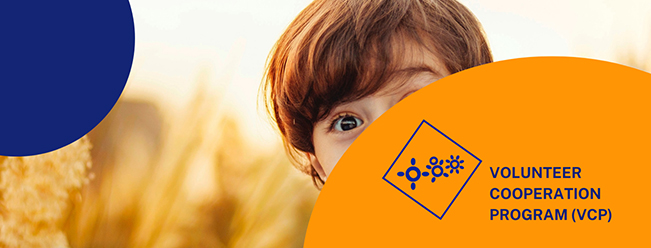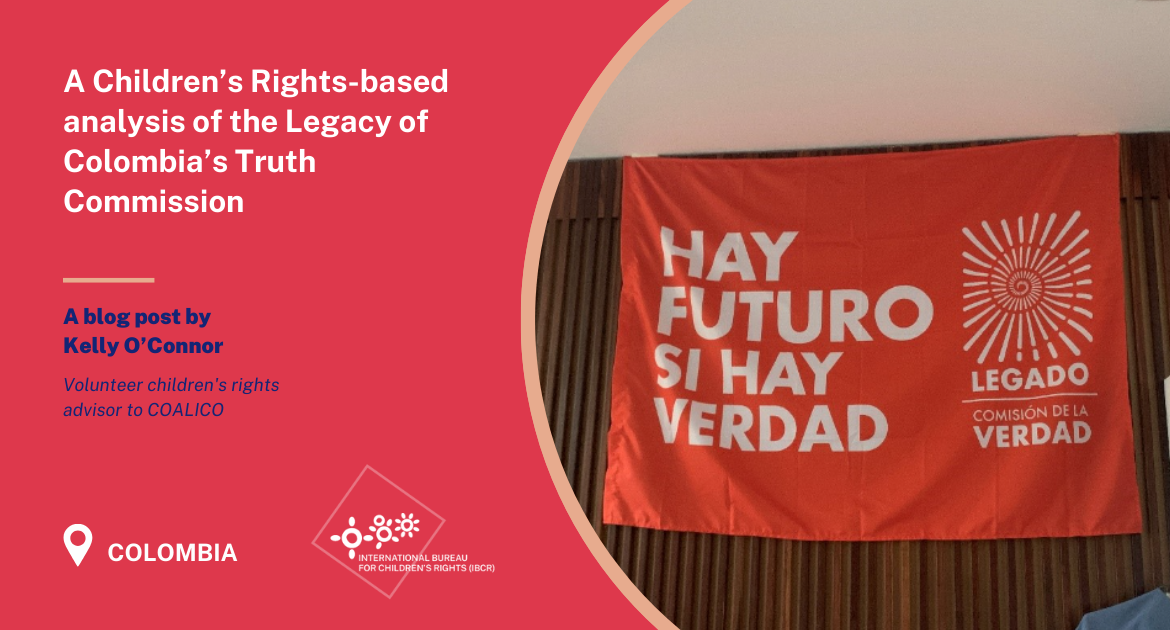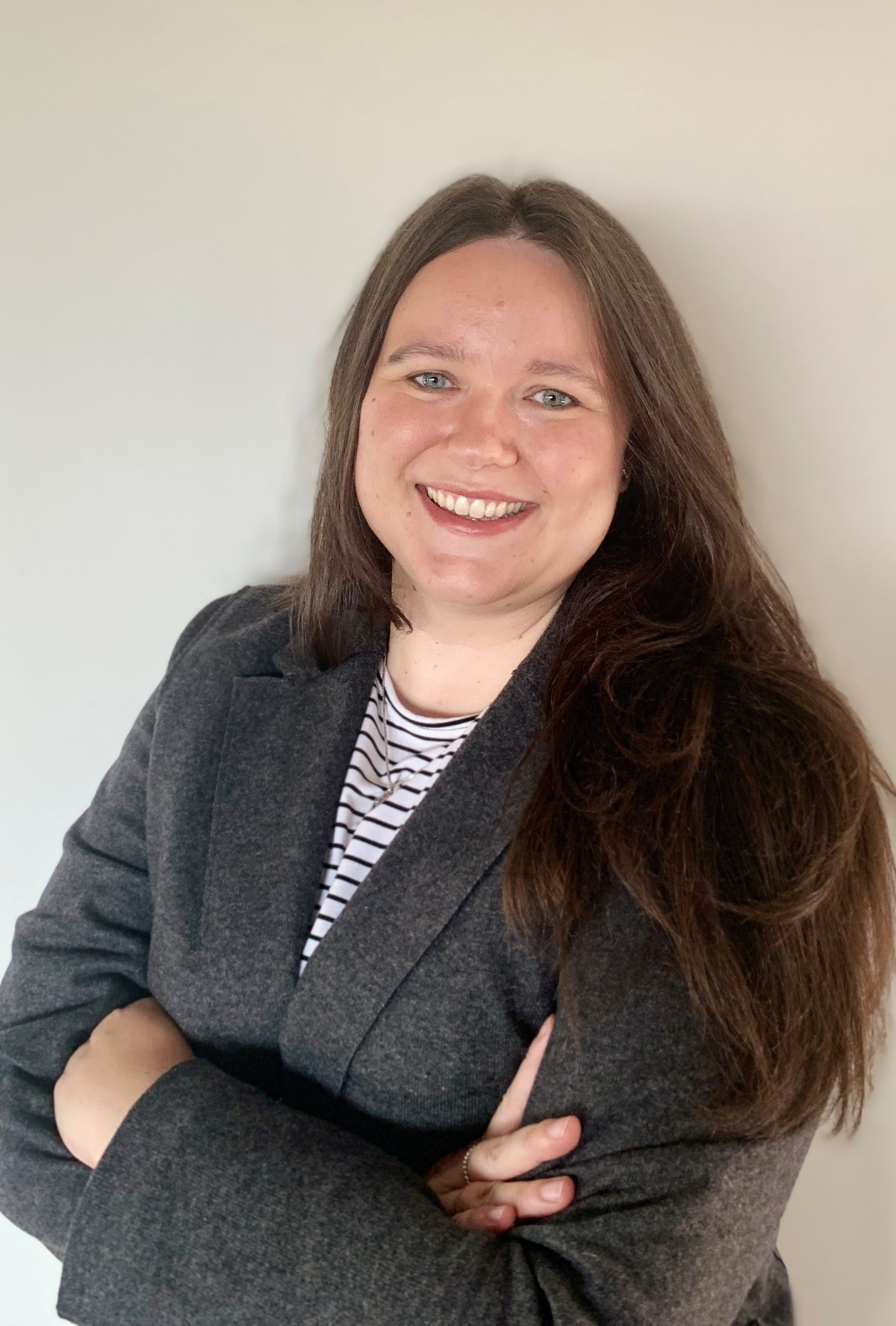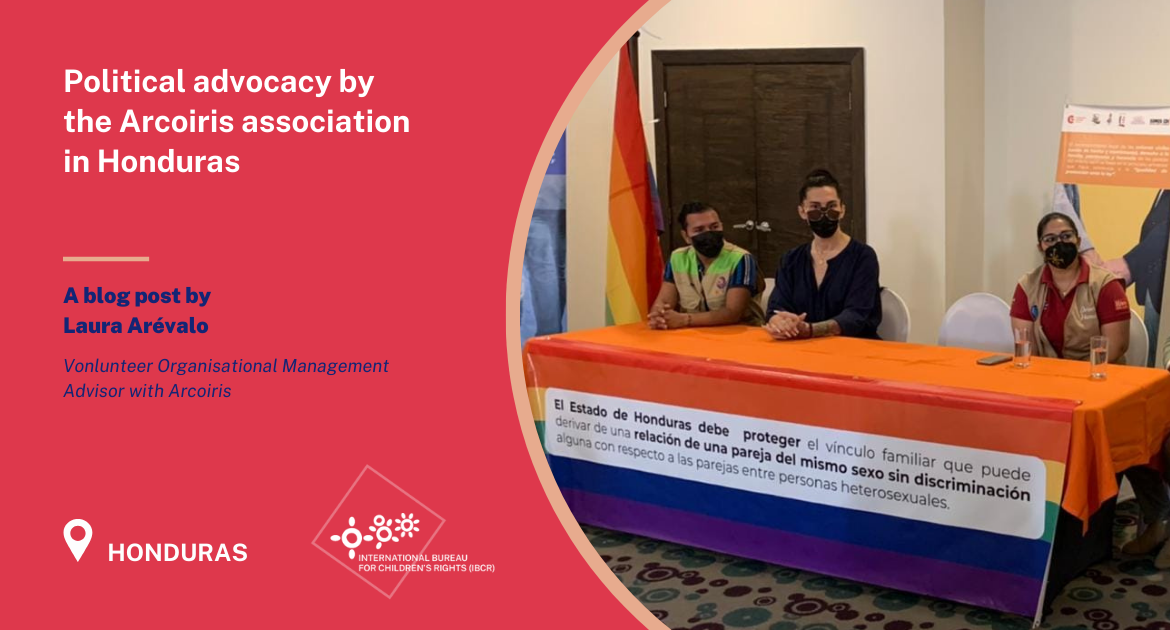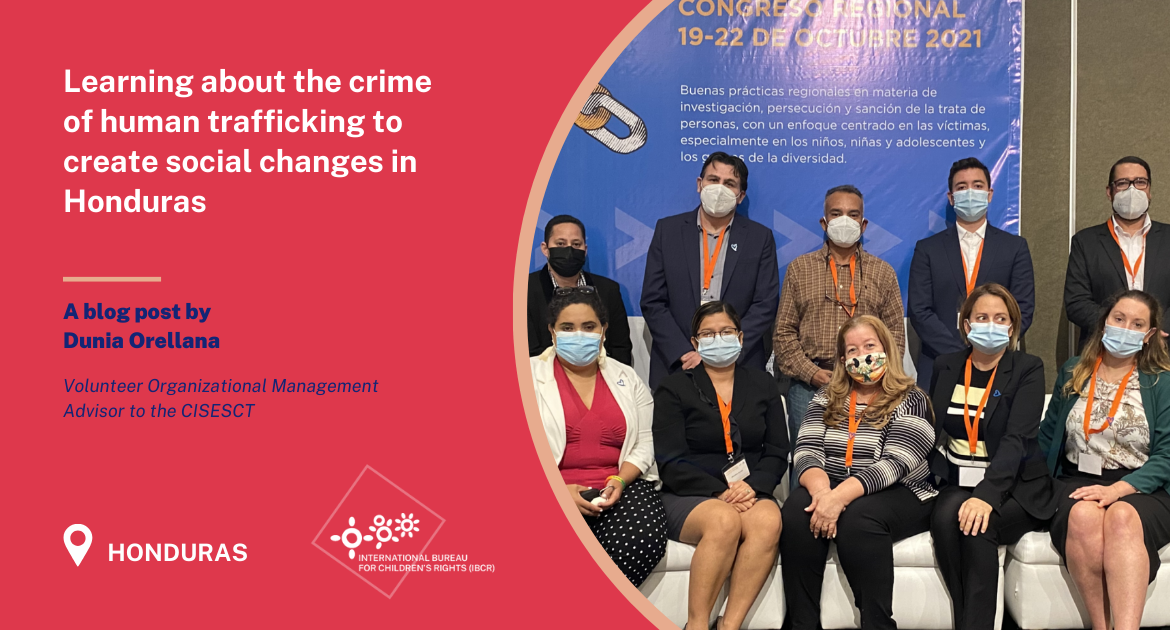I am a little over half-way through my mandate in Bogotá, Colombia as a Children’s Rights Advisor to the IBCR partner organization COALICO (Coalition against the involvement of Children and Young People in the Armed Conflict in Colombia). I’ve really enjoyed getting to know Bogotá and my Colombian colleagues. Fun fact: did you know that Bogotá has a relatively cool climate, due to its location at an altitude of 2600m above sea level? Some of my friends back home are surprised when I video chat them wearing sweaters and scarves!
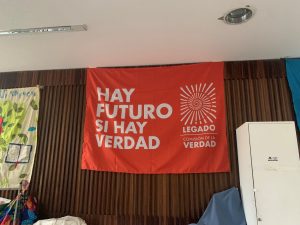
“There is a future if there is truth” is the slogan of the Truth Commission. Picture taken in the Centre for Historical Memory during the COALICO´s event celebrating World Children’s Day. Bogotá, 28 November 2022.
As an international human rights lawyer, I find the work of the COALICO in Colombia extremely interesting. It is a very special time to be working on issues relating to armed conflict in Colombia. In 2016, the Colombian government signed a peace deal with the Fuerzas Armadas Revolucionarias de Colombia – Ejército del Pueblo (Revolutionary Armed Forces of Colombia – People’s Army, FARC-EP). The peace agreement was historic, ending more than five decades of armed conflict and earning Colombian President Juan Manuel Santos a Nobel Peace Prize.
One of the many provisions of the peace agreement was the creation of a Truth Commission (officially, Comisión para el Esclarecimiento de la Verdad, la Convivencia y la No repetición). The Truth Commission started its work in 2018 and delivered the final report in June 2022. The publication of the final report was followed by two months in which it held events to publicise its findings. Most relevant to my work with the IBCR and the COALICO is the chapter about the impact of armed conflict on children and adolescents in Colombia: No es un mal menor: Niñas, niños y adolescentes en el conflicto armado (No lesser evil: Children and Adolescents in Armed Conflict). Note: the title is a play on words that is difficult to translate. No es un mal menor means “It is no lesser evil” but the word menor also means minor, as in under the age of majority.
On August 5th, I attended an event by the Truth Commission publicising the chapter on children and armed conflict. Due to space limitations at the venue, I attended the event virtually, and got to hear the team responsible for the report thank the COALICO for its support in their research. Hilda Molano, the Coordinator of the Technical Secretariat of the COALICO, made some remarks. Hilda emphasized the excellent work of the Commission in centring the participation of children in the chapter. She noted that many times children’s voices are heard only at the end or not at all. She also highlighted that the chapter recognized violations of children’s rights in the conflict, beyond their recruitment and use by armed groups.
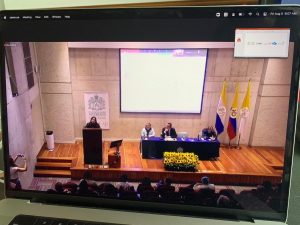
Hilda Molano, Coordinator of the Technical Secretariat of the COALICO, speaking during the Truth Commission’s event presenting the chapter on Children and Armed Conflict to civil society organizations. Bogotá, 5 August 2022.
The researchers who worked on the chapter then gave an overview of its content. The Commission received statements from 2744 witnesses, who described violations against 4014 victims who were under 18 years old at the time of the violations.
Violations of Children’s Rights in Armed Conflict
When people think of children in armed conflict, oftentimes child soldiers is the first thing that comes to mind. The Truth Commission report is revolutionary because it identifies many violations of children’s rights in armed conflict, beyond recruitment and use. The report identifies 4 categories of violations of children’s rights:
1.Children who are orphaned or who suffer the absence of their parents or caregivers
Children whose parents were killed or disappeared during the armed conflict suffered violations of their rights. This violation of children’s rights has been under-recognized, but its impacts are significant. Children who lose their parents in armed conflict lose links with their families. In Indigenous and Afro-descendant communities especially, children can lose the ability to know their own culture and traditions. Many children whose parents were killed or disappeared subsequently suffered displacement as well. Finally, the Truth Commission identified that children, especially girls, who lost their parents during the conflict, were at higher risk of suffering other violations including sexual violence.
2. Forced displacement of children
More than 3 million children have been registered as displaced. The Truth Commission describes displacement of children as part of a chain of violence, including violence they experienced before and after displacement. While forced displacement is one of the most recognized human rights violations in Colombia’s conflict, the government’s response has been insufficient to protect children, who often experience more violations after displacement.
3. Armed conflict in and around schools and educational institutions
Schools have an important role in children’s lives, even beyond their right to education. In some regions of Colombia, schools are the only state institution. The Truth Commission made a landmark finding about schools in Colombia’s armed conflict: both armed groups and Colombia’s armed forces treated schools as a strategic objective. This is a violation of the principle of distinction in International Humanitarian Law. Unfortunately, while the conflict between the Colombian state and the FARC-EP has ended, there is still conflict in Colombia involving other actors, and schools remain at the centre.
4. Involvement of children with armed groups (recruitment and use)
There are two main categories of involvement of children with armed groups: recruitment and use. In recruitment, children become members of armed groups. Even if children appear to join the armed group voluntarily, they should be considered victims, as armed groups forcibly recruit children through physical force, deception, persuasion, or seduction. Truth Commission established that the FARC-EP was the armed group that recruited the most children. With use, children are used by the armed groups to undertake activities such as delivery of weapons, food, or drugs, to gather intelligence, or for extortion. The Colombian military is especially noted for using children to gather intelligence. Children who become involved with armed groups can suffer other violations, such as reproductive violence, sexual violence, physical punishment, forced labour, and injury or death in military operations.
The Legacy of the Truth Commission
Now that the Truth Commission has published its findings, Colombia’s government and its citizens need to learn from them to bring closure to the victims and to prevent such harms from happening again. Colombia’s vibrant civil society, including the IBCR’s partner organizations, are working on ensuring that this happens.
The Truth Commission has an interactive website where educators and the public can consult the chapter on Children and Adolescents in an interactive way here
In October 2022, I attended a conference at the National University of Colombia, where educators put together policy recommendations for the government on education in a time of transition. There were several talks on how to incorporate the Truth Commission’s findings into school curricula in an age-appropriate way.
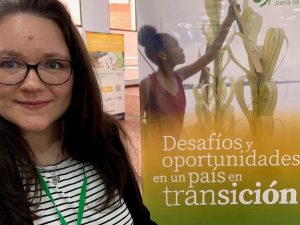
“Challenges and opportunities in a country of transition”: the conference I attended at the National University of Colombia. Bogotá, 5-8 October 2022.
In November 2022, the COALICO held an event in celebration of World Children’s Day and to discuss the legacy of the truth commission. The event was livestreamed on YouTube.
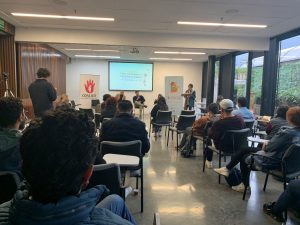
“And now, what should be done with the legacy of the Truth Commission”: A COALICO event in honour of World Children’s Day. Bogotá, 28 November 2022.
Although the Peace Agreement has been signed and is being implemented, that doesn’t mean the end of armed conflict in Colombia. Several armed groups continue to operate in the country, and various regions continue to feel the effects of conflict. During my mandate, I have had the chance to support the COALICO’s Observatory on Children and Armed Conflict in its monitoring of violations of children’s rights linked to armed conflict. An increased awareness of the conclusions of the Truth Commission’s report can help encourage the development of better public policy that protects children’s rights in armed conflict.
It is important to get the word out about the findings of the Truth Commission so that victims can heal and to ensure these violations are not repeated in the future. Colombian civil society is up to the task, and I am glad that the IBCR is part of the international community supporting their efforts.
Interested by international volunteering?
Find out more about our open mandates
KEEP ME INFORMED OF UPCOMING VOLUNTEERING OPPORTUNITIES

Volunteer cooperation program funded by Global Affairs Canada.




